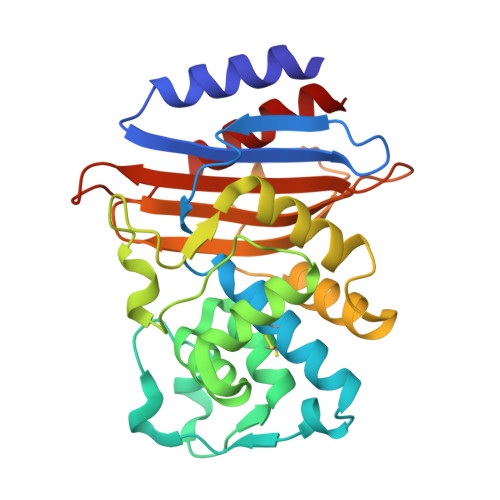Burkholderia pseudomallei PenI beta-lactamase and variants are potently inhibited by taniborbactam.
Mojica, M.F., Becka, S.A., Edwards, M., Myers, C., Uehara, K., Uehara, T., Hoshino, T., Zeiser, E.T., Chatwin, C.L., Six, D.A., Bonomo, R.A., Papp-Wallace, K.M., Nukaga, M.(2025) Antimicrob Agents Chemother 69: e0078725-e0078725
- PubMed: 40938351
- DOI: https://doi.org/10.1128/aac.00787-25
- Primary Citation of Related Structures:
9JSE - PubMed Abstract:
Burkholderia pseudomallei is a Gram-negative pathogen that causes melioidosis, a severe and often fatal disease. Due to its recognized potential as a bioterrorism agent, it is critical that appropriate antimicrobial agents are available for post-exposure prophylaxis and treatment of melioidosis. Cefepime-taniborbactam is a novel β-lactam-β-lactamase inhibitor combination in clinical development, with promising activity against Gram-negative bacteria producing class A, B, C, and/or D β-lactamases. Herein, we demonstrate the inhibitory activity of taniborbactam against PenI, the class A β-lactamase produced by B. pseudomallei . Isogenic Escherichia coli strains producing PenI and its ceftazidime-resistance-conferring variants (C69Y and P167S) showed ceftazidime minimum inhibitory concentration (MIC) of 64 mg/L for the strain producing PenI and 1,024 mg/L for the strains producing the variants, whereas cefepime MIC was 128-256 mg/L for these three strains. While the addition of avibactam decreased ceftazidime MIC to 1 mg/L for PenI and 8-16 mg/L for the variants, the addition of taniborbactam decreased cefepime MIC to ≤0.5 mg/L for PenI and the variants. Similarly, an 8-fold reduction of the cefepime MIC upon addition of taniborbactam was observed in an avirulent B. pseudomallei strain. Furthermore, taniborbactam inhibited PenI and its C69Y variant with an apparent K i of 0.11 and 3.1 µM, respectively. Lastly, co-crystallography and molecular dynamics simulations showed that taniborbactam induced the formation of a disulfide bond between Cys77 and Cys123, which destabilizes the deacylation water and strengthens the taniborbactam-PenI complex. These results support the development of cefepime-taniborbactam as a promising agent for the treatment of infections by B. pseudomallei .
- Department of Molecular Biology and Microbiology, Case Western Reserve University School of Medicine, Cleveland, Ohio, USA.
Organizational Affiliation:


















